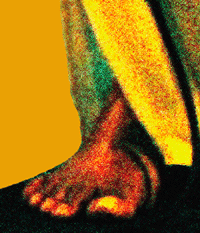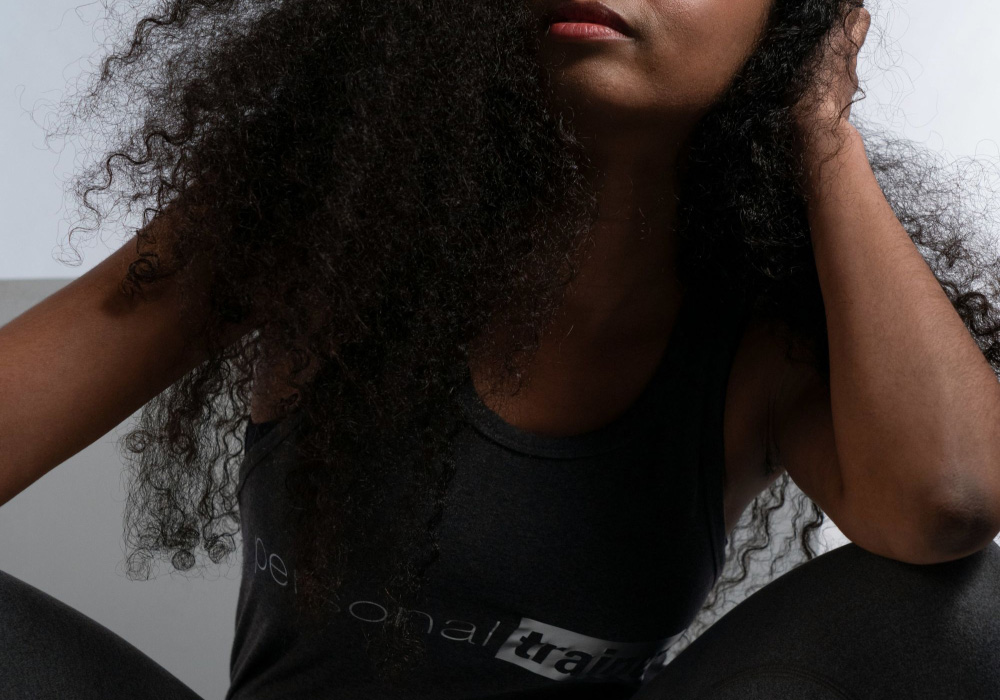How far would you go to find yourself? Ethiopian-born playwright Rebecca Fisseha asks us to explore this question in her first full-length play and main stage production, Wise.Woman, now showing at Toronto’s Theatre Centre (1087 Queen W). The play, which opened on February 20th, will close this coming weekend with three more days of presentations.
Rebecca Fisseha is an emerging playwright and York University graduate who honed her writing skills as a member of b current’s rAiz’n the sun training ensemble. She originally submitted Wise Woman of Abyssinia to rock.paper.sistahz III 2004. Other works featured as workshop productions with b current, Obsidian and the SummerWorks and Crosscurrents festivals are February, The Exhibition of Love, Leaving Home, The Product and Daughter’s Last Supper.
Wise Woman tells the story of a Westernized young Ethiopian woman, Saba, who returns to her ancestral land to marry her childhood sweetheart, Solomon. The play also explores the ancient tale of the Queen of Sheba (Queen Mak’da)’s visit to the land of Judah. Thus, the main character, played by Cara Ricketts, assumes both the modern and ancient roles of Saba and Queen Mak’da.
AfroToronto.com recently had the opportunity to interview Rebecca Fisseha about her play:
AT: The play talks about a journey of self-discovery and cultural reawakening, which is very relevant for multicultural Canadian youth. What has the response been so far from Ethiopian and other youth in workshops and the current production?
RF: I believe they are very happy to see a show that references stories, locales, and expressions that are familiar to them, either because they grew up in that environment or because they know it secondhand from their parents or extended family. Seeing live theatre on stage by people who, for the most part, look and sound like them has also been refreshing. They appreciate the scale and look of the show as well as the message of self-reliance that it communicates. I hope that we will have more opportunities to perform for school and community groups in the future so that we can get more detailed feedback from the youth.
AT: What did that journey in writing Wise.Woman bring to you personally?
RF: It allowed me to comprehend one aspect of my cultural heritage in a way that I probably wouldn't have had it not been for the time and thought that went into writing the play. Now that I have completed it, I feel brave enough to apply the same interpretive twist to the many other traditions, stories, myths and legends that I have grown up with and find out what they mean to me personally. With Wise.Woman, I came to see the story of King Solomon and Queen of Sheba not only as the nation-founding legend it has always been presented as but as the story of one woman who chose to go her own way -"into her own country"- and by doing so ensured her immortal place in history.
AT: How did the play evolve from the initial conception through the fleshing out of the plot and ideas with a dramaturge and/or producer?
RF: It evolved over approximately four years, with a lot of gaps in between where I wasn't necessarily writing or rewriting or researching or workshopping the script with actors and a dramaturge. I like to consider the gaps in between the times of activity as "simmering", because that is when I processed, most often subconsciously, all the work that I had done on the script. The initial story was always the story of King Solomon and Queen of Sheba. Out of that emerged the figure of a couple of tourists, a man and a woman. The play as it is today emerged out of a continued exploration of the worlds of those two pairs of people, their humanity, their search for belonging and what I, as a writer, had to say about them from where I stand. My dramaturge and director ahdri zhina mandiela was instrumental in helping me articulate what I, Rebecca, had to say about this piece of history that I was dramatizing and juxtaposing with a modern story. Without that, the play would have rang hollow, it would have been purely presentational.
AT: What impact do you hope the play will have on those who see it?
RF: The repeated response so far has been that people have never seen anything quite like this show before. The mixture of old and new worlds, the creative use of chorus members to create setting and mood, the use of live singing and the blending of modern dialogue with ancient heightened text - a lot of it inspired by the Song of Songs - has created and I hope will continue to create a feeling of having been teleported to another place and time for those who see it. It is also an opportunity for audiences to experience a culture that is not often showcased on the stage, that of Ethiopia. As a bonus, we have a traditional Ethiopian coffee ceremony on Sundays, so if nothing else, people will walk away with a little organic East African caffeine running through their veins!
AT: Where do you see the world of theatre-going in Toronto with respect to diverse voices both on stage and behind the stage?
RF: I expect that the future will be more of the present. We will see even more of what we are beginning to see in terms of diversity. However, it has also been said by those who have been at it longer than I have that things move in cycles so that a period of increased diversity will be followed by its opposite and so forth. So, while I cannot predict with any certainty either way, it is in my interest to hope for the best. I look forward to the day when diversity becomes the norm as opposed to an exception that has to be highlighted every rare time that it makes an appearance.
AT: A few words about the cast members?
RF: The truly wonderful aspect of the cast of six and chorus of nine members is the multiplicity of cultural backgrounds that they represent. The group as a whole is a very accurate picture of the idea of Canada: people who originate from nearly every continent and call this place home for their own individual reasons. I really doubt that such a collection of individuals has ever graced a stage in Toronto theatre history. As well they also contribute quite a wide range of performance experience, from members who have several Stratford seasons under their belt to those who have recently begun their performance training under b current's rAiz'n training ensemble for emerging artists.
Wise.Woman runs until March 8, 2009, at The Theatre Centre, 1087 Queen Street West (Queen & Dovercourt) on Friday and Saturday at 2 pm & 8 pm and Sundays at 6 pm (weekday Matinees also available for Schools). Tickets are $15 for students & artworkers and $20 for adults, general. Tickets can be purchased online at www.artsboxoffice.ca.
For group sales, the teacher preview, and school sales, call 416 533 1500 or email





